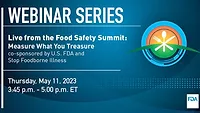Recalls and the True "Last Mile"

Credit: RODNAE Productions (rodnae-prod) via Pexels
It will come as no surprise to avid Food Safety Magazine readers that we have a beef (pun intended) with the current recall system. This is the third article in a series focusing on how the system is failing those it is meant to serve. The previous articles can be read here1 and here.2 Recall modernization is a food safety policy priority at Stop Foodborne Illness, as the current system is outdated and lacks consistency between regulatory agencies, and the language utilized creates confusion for consumers.
Recalls are the last best hope to remove potentially harmful food from the home pantries of consumers. They also create unintended consequences for the true "last mile"—the food donation pipeline. Stop Foodborne Illness reached out to its partners at Feeding America to provide perspective on an often overlooked, but increasingly critical, part of the recall stakeholder group: food banks and the pantry network. Feeding America estimates that it provided food assistance to over 53 million people in 2021.3 It is a staggering number that increased during the pandemic and has not yielded.
For those not familiar with the food banking system, grocery products suitable for donation are collected from retail stores and then distributed by food banks and food pantries. The Feeding America system of food distribution is a network of 200 food banks that serve 60,000 community food pantries and meal sites.4 Grocery items are donated for many reasons: dented or torn packaging, the calendar date on the package is close to the quality date printed on the item, and excess product. At the retail level, food and grocery donations are made by unit, not in pallet or case quantities, and the retailer typically does not track the donations as they go out the back door.
Recalls in the Food Donation Pipeline
Feeding America and its network of food banks are still working to manage supply chain disruptions for two food streams: (1) donated food and grocery products, and (2) purchased products that supplement donations and add nutritional benefits.
Product recalls and withdrawals place an additional burden on food banks when sorting through donated food and grocery products. Recalled items must be removed from inventory, food drives, pantry and meal program orders, and, in some instances, branch warehouses. When a food bank receives information about a recalled product or a withdrawal, volunteers, in conjunction with paid food bank staff, must inspect and sort through potentially hundreds of gaylord bins, banana boxes, and pallets of mixed products to locate the impacted product(s).
Paid food bank staff alert each volunteer about current recalled product information as part of the onboarding process and during pre-shift meetings. Food banks post recall notices in product sorting areas to ensure that recalled products are not being distributed. This information is also shared with partner food pantries and meal programs via email alerts and an updated online food bank inventory.
Looking for quick answers on food safety topics?
Try Ask FSM, our new smart AI search tool.
Ask FSM →
For recalls and withdrawal processes, volunteers and food bank staff will separate the product, record the amounts, and then follow the manufacturer's instructions for retrieval, disposal, hold, or another outcome. When a large recall occurs that affects a particular category of food (e.g., peanut butter), food banks may have to remove and dispose of multiple products, leading to low inventory for those types of foods. If a recall snowballs (i.e., when more products are added to the recall over time), it requires much more human resources, as all of the products must continually be resorted to remove the additional impacted products.
Consumers that utilize food pantries to supplement their food needs are adversely impacted by recalls as communication about recalled foods is difficult to access. The food industry considers the retail establishment to be the "last mile"; however, the end of the farm-to-fork continuum extends beyond the store to the food bank and food pantry support system.
The current procedure to alert food banks includes reviewing the daily recall feeds from the U.S. Food and Drug Administration (FDA) and the U.S. Department of Agriculture (USDA) and sending them via email to at least two employees of each food bank, in a template that contains the essential information. The food banks then send the notices to their network of community partners; however, these partners are not open every day—some only once a month—and a high percentage of them are run by an all-volunteer staff. It is unknown whether the information gets distributed to those that frequent community pantries and, more specifically, to those who may have received the recalled product.
Recalled shelf-stable and frozen products are an even greater concern as they can remain in consumers' pantries or freezers for many months prior to being consumed. If individuals are frequenting food pantries or shopping only occasionally at retail stores, how do they gain access to recall information? Their "purchases" are not tracked by a store's shopper card, and these individuals may have limited access to the internet to check government websites for recalls. Moreover, many individuals that access food programs live in so-called "food deserts" or "food apartheid areas" and do not have regular access to a retail grocery outlet, which limits their access to recall information that may be posted on store notice boards.
Another aspect of recalls that is often overlooked (or ignored) is that individuals who regularly leverage food pantries likely do not have the resources to replace recalled items. This creates additional disparity, as recipients cannot return items for a replacement. In a best-case scenario, individuals have the time, physical ability, and resources to travel to another food pantry and find a replacement product. However, as food banks and pantries are largely reliant on donations, it may take weeks to receive a similar item.
Curbing the Impact of Recalls
As a nonprofit dependent on food donations, Feeding America works with manufacturers and vendors to ensure awareness of its relabeling capability. Relabeling may be needed if a product has an omitted or incorrect ingredient on the label or an undeclared allergen (but not a pathogen). This puts additional strain on food bank resources to generate labels and train staff or volunteer labor to strip and relabel items with the missing or correct ingredient. As per the federal Fair Labeling and Packaging Act of 1967, food banks may relabel products without having to include nutritional information, but the label must have the following information:
- Common name of the product
- Ingredients in ascending order
- Net weight
- Name of the manufacturer, packer, or distributor.
Having the option to relabel a product in a recall or withdrawal situation helps ensure that it goes to those who need it instead of ending up in a landfill.
Recalls are an integral element of the comprehensive food safety system in the U.S. Removing potentially life-threatening products from store shelves and home pantries is essential, and making this process more efficient for the food banks and pantries is vital. The modernization of the current recall system must be inclusive of the entire distribution chain—including the real "last mile." Those who need help the most cannot be omitted from the equation as we move toward a modern, more consumer-friendly approach to recall communication.
- Coffman, Vanessa and Mitzi D. Baum. "Modernizing Recalls is a Must for Consumer Safety." Food Safety Magazine. June 7, 2022. https://www.food-safety.com/articles/7780-modernizing-recalls-is-a-must-for-consumer-safety.
- Baum, Mitzi D. and Vanessa Coffman. "Food Companies Struggle with a Fragmented Recall System." Food Safety Magazine. August 29, 2022. https://www.food-safety.com/articles/7967-food-companies-struggle-with-a-fragmented-recall-system.
- Feeding America. "Charitable Food Assistance Participation in 2021." https://www.feedingamerica.org/research/charitable-food-access.
- Feeding America. "The Feeding America Network." https://www.feedingamerica.org/our-work/food-bank-network.








